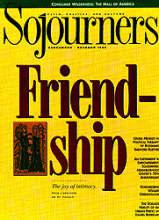On Sunday, June 13, Baltimore pitcher Mike Mussina hit Seattle Mariner reserve Bill Haselman on the shoulder with a fastball. Haselman charged the mound, sparking one of the ugliest, most violent baseball brawls in years, a 20-minute slugfest that left several players injured and seven ejected.
The following week, another melee erupted after a brush-back pitch. Once again, benches emptied and punches were thrown. This time, however, the setting was a youth-league game in Tacoma, Washington. According to their coach, the teen-age players said they were "just acting like the pros."
Are big-time sports celebs role models? The NBA's Charles Barkley, in the words of his Nike ad-writers, says no. "I am not a role model," Sir Charles intones in the now-infamous shoe commercial. "Parents should be role models. Just because I dunk a basketball doesn't mean I should raise your kids."
Whether they accept the responsibility or not, sports celebrities are looked up to by millions of young (and formerly young) people. And when they agree to be paid for an endorsement or a commercial, they are explicitly asking consumers to follow their lead. Many modern got-rich-quick athletes want to reap the rewards of fame without accepting the costs.
But saying that athletes are emulated is not saying that they are heroes. Ted Tollefson, co-founder of a Minneapolis institute that studies mythology and culture, says a hero has four defining attributes. A hero does something worth talking about, serves principles larger than self, lives a life worthy of imitation, and is a catalyst for change. A "celebrity," on the other hand, is merely someone who has captured the public eye, if only for the allotted 15 minutes. Michael Jordan or Madonna may be worth talking about, but they arguably serve no principle beyond themselves.
Read the Full Article

